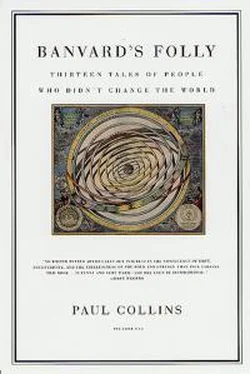Ephraim proved a quick study at goldbeating, and he grew to eventually run his own workshop, where he turned out gold leaf for bookbinders and gilders. But the hot and dusty workplace, not to mention the crowded environs of the city, was aggravating his lungs. By 1836, the situation had become plain to him and
his doctor: he needed to move to the country. Ephraim and his wife moved twenty miles away to Concord, the quiet village where the Revolution had started so many years before. They were delighted to find that they could afford a seventeen-acre farm out on Lexington Road.
There was just one catch: the next-door neighbor was positively bizarre.
Bronson Alcott, just a few years older than Ephraim, was if anything even more bookish. He too had had little formal schooling, though this hadn't prevented him from founding his own school in Boston. He'd formulated a progressive approach to education that promoted Platonic dialogue and self-paced, individually motivated learning over the traditional approach of rote memorization and instructor lecturing. Children were encouraged to keep journals, and classroom dialogues ventured into religious inquiry and a mild prototype of health and sex education. For these groundbreaking contributions to American education, the young man was of course pilloried in the newspapers for "indecency." But Alcott continued to practice his own enlightened and utterly modern educational theories on his most apt pupil: his own daughter, Louisa May.
1836 was an auspicious time for Bull to have settled next door. Alcott's close friend Ralph Waldo Emerson had just published a revolutionary essay titled Nature, and Alcott himself was busy finishing an extraordinary--and now forgotten--volume of transcribed dialogues with children about religion, Conversations on the Gospels (1837). When it came out he was roasted again in the press for having the temerity to suggest that young people might have anything meaningful to say about God. Hundreds of unsold copies ended up being bought as scrap paper and used to line trunks.
Alcott bore failure well. He had to, because ever since his first job, as a traveling salesman, pretty much everything he had tried his hand at had failed. He was a man of equally vast impracticality and vision, and eerily prescient in his pursuits: women's rights, the abolition of slavery, banning tobacco on health grounds, and eating what he dubbed a "Pythagorean diet"--today it would be called vegan. Emerson was so delighted by Alcott that at one point he seriously proposed that their families move in together.
One other subject particularly attracted Alcott's notice: the newly flowering science of genetics. This was a field in which he and Ephraim had much to enthuse over. Most interesting of all was the work of a Belgian physician, Jean Baptiste Van Mons, who possessed a seemingly miraculous skill at selectively breeding and cross-pollinating pears; by isolating the best aspects of each strain, he had bred forty distinct and superior types of the fruit.
Any conversations Ephraim and Bronson had on the latest work of Van Mons were eventually cut short, though, by Alcott's announcement that he--along with most of the members of the burgeoning Transcendentalist movement in Concord--was departing to found a utopian agrarian colony, Fruitlands. In his place came a new tenant for the farm next door--a hack writer named Hawthorne.
Writing many years later, Julian Hawthorne remembered watching his father, Nathaniel, and his neighbor, Ephraim Bull, philosophizing over long summer days on politics, human nature, morality, and ... grape growing. On dusty fall days, Bull would work at installing a long fence along one border of the property, although he wasn't much interested in keeping the neighbors away; whenever he saw the Hawthorne children, he'd invite them to climb the fence and eat as many grapes right off the vine as they could hold. "It seems to me," Julian Hawthorne later mused, "that he could hardly have realized our capacity."
Bull made a vivid impression on the young boy: He was as eccentric as his name; but he was a genuine and substantive man, and my father took a great liking to him, which was reciprocated. He was short and powerful, with long arms, and a big head covered with bushy hair and a jungle beard, from which looked out a pair of eyes singularly brilliant and penetrating. He had brains to think with, as well as strong and skillful hands; he personally did three-fourths of the labor on his vineyard, and every grape vine had his separate care.
His frequent work alone in the vineyard may have been a necessity for Bull; as friendly as he was, he had a monumental temper, and whenever he brought hired laborers into his vineyard he'd get so exasperated at their stupidity that his roaring could be heard all the way across the farm and in the Hawthornes' yard--"like the sounds of a distant battle," Julian recalled.
But Bull was indeed engaged in a mighty struggle. With native varieties of grapes--which were scarcely worth noticing, to most viticulturists--he was going to try to breed a hardy open-air grape that would not only rival the best European grapes in flavor but have the native resistance and early growing cycles needed to survive New England insects, diseases, and autumnal cold snaps. Bull had some support in this; the scholar James Mease had argued for the development of native varieties in his Domestic Encyclopedia as early as 1804. But it was easier said than done.
Grape breeding requires patience. While grape growers typically propagate their vines by cutting and grafting, this doesn't work for breeding. Cutting and grafting is biologically static: you are growing a clone. That's great for farmers, as grafts grow quickly and consistently. But to breed a new variety, you need variation. And there's only one way to do that naturally--you plant seeds, and you wait.
Grape genetic material varies from seed to seed; the seeds that come from a single bunch can be as different from one another as sons and daughters of by the same parents. The seeds of any given grapevine provide a wide array of genetic permutations to work with, both useful and useless. But it is impossible to judge the quality of your breed until they bear fruit, and that takes at least two growing seasons. From there, you might have to go through many successive generations of seed selection and cross-pollination before you get the characteristics you want from a grape.
This can take years, decades. Even entire lives.
Breeding begins with a single plant, and Bull didn't find his in a vineyard or a commercial nursery. He found it by the kitchen drain behind his house. It was a Vitis labrusca, a northern fox grape, and this one bore fruit early in the growing season. Early fruition was crucial for any grape that would grow in New England, and so Bull tasted the grape flesh and examined the vine carefully. "The crop was abundant, and of very good quality for a wild grape,"
he later recalled. "I sowed the seed in the autumn of 1843."
His methods of planting were simple enough: "I put these grapes whole, into the ground, skin and all, at a depth of two inches, about the first of October, after they had thoroughly ripened. I nursed these seedlings for six years, and of this large number, only one proved worth saving." That one was, he decided, to be called the Concord grape. After three generations of fruition and culling, he was ready to show off his new creation to a visitor to the house. On September 10, 1849, he picked a bunch of grapes when they were their ripest and presented some to a neighbor. He watched as the man
sampled the new fruits.
"Why," the man marveled, "this is better than the Isabella!"
This was excellent news for Bull; his new grape had already surpassed the most palatable of native grapes. Emboldened, he took some cuttings down to the offices of the Boston Cultivator, offering to trade one of his Concord cuttings for some of the Cultivator's vine samples. But he forbade the Cultivator staff from selling anything they grew from his vine; he needed a few years to propagate his grapes before he unveiled his work to the public.
Читать дальше











